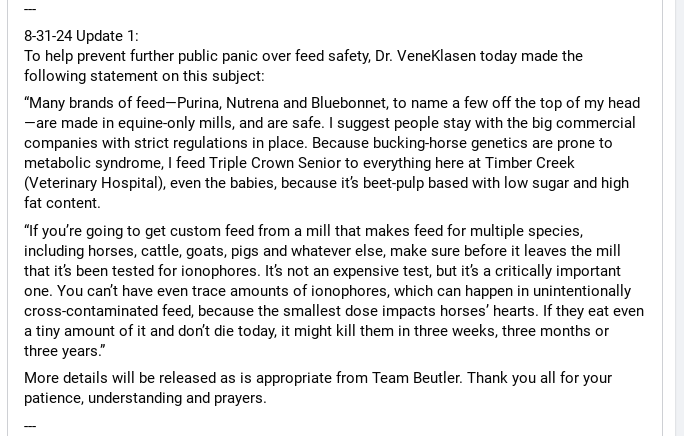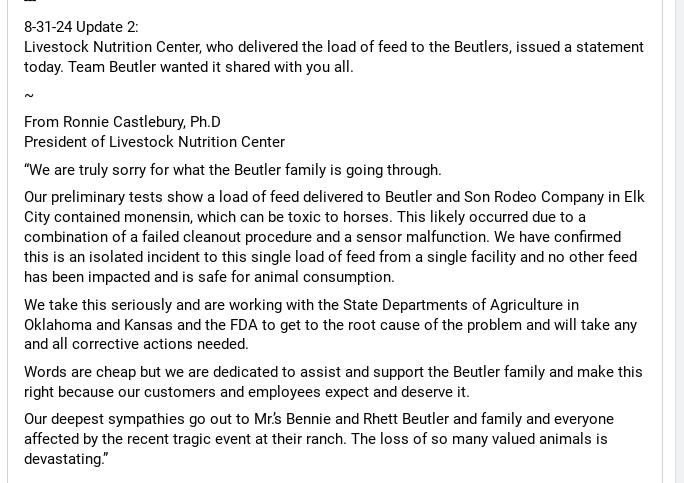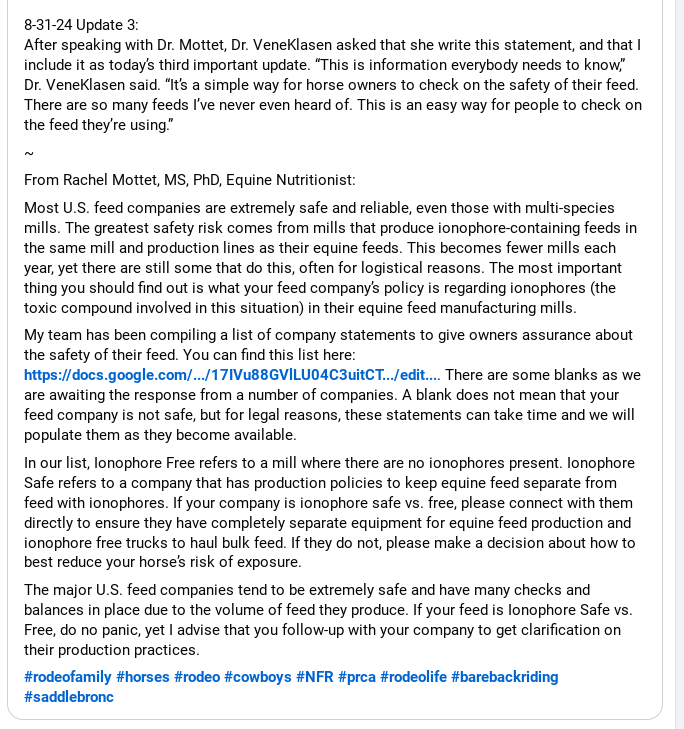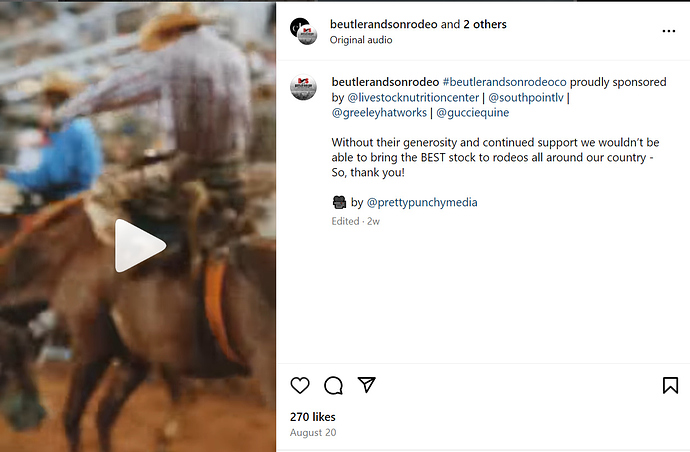I also think the insiders are sensitive to rodeo being a PETA sort of target for activists, so thinking it’s intentional/an attack may be rooted in that bias (which is entirely reasonable).
I don’t think that “ionophore free” and “ionophore safe” are terms defined by the FDA (or other government agency), are they? I haven’t been able to find any references/citations. So if there aren’t true regulatory/statutory definitions of these it contributes to the confusion.
The FDA does have a guidance on Practices to Prevent Unsafe Contamination of Animal Feed from Drug Carryover but that doesn’t use that terminology at all.
It’s a requirement that facilities with medications have practices to prevent adulteration, however the specific practices are up to the discretion of each facility based on the specifics of the facility. I’m guessing this is where the “ionophore safe” comes from and why you need to inquire what their specific practices are and decide if they are stringent enough for you to be considered safe.
The guidance does have a specific call-out for horses and ionophores, but there are no defined requirements beyond this suggestion:
Horses are particularly sensitive to ionophore drugs (e.g., monensin or lasalocid); ingestion of these drugs may result in severe or fatal effects in horses (Ref. 3). Horse feed should not be manufactured immediately after production of medicated feed containing an ionophore drug.
Obligatory I am not a lawyer/ attorney disclaimer - I work in compliance in a different, although also highly regulated, industry and to put such a strong statement on their website would make me feel pretty strongly that those words are accurate (“never a chance of contamination” is VERY strongly worded IMO). IIWM on their compliance team/ copy reviewing for compliance I wouldn’t put something like that out there unless the company truly did not ever have those chemicals on the property. Not all compliance teams feel the same WRT risk tolerance but “never” is usually a big no no unless it’s absolutely true.
As another former compliance officer and regulatory affairs peep in a highly regulated industry, I totally agree.
As a practical matter I know the company owns its own mill and only makes horse feed (and the obligatory “all species” economy feed). That in itself doesn’t mean they don’t make other feed at the plant for other clients, but when you read the statement either it’s true or they are as dumb as a box of rocks. The latter is highly unlikely.
Any updates? What a horrible situation!
Thank you Trubandloki, I am not on Facebook so couldn’t see it!
Not their first rodeo, no pun intended 


https://www.fda.gov/inspections-compliance-enforcement-and-criminal-investigations/warning-letters/livestock-nutrition-center-643701-12152022
TL;DR - not the first time the livestock feed company has been found to be lacking in proper cleanout. Monensin killed deer with feed that was contaminated in 2022
They are" truly sorry" but not as sorry as they are going to be when the lawsuit hits. Especially when their prior lack of controls caused another disaster in 2022. Doesn’t sound like they took that very seriously. But suing them might be like trying to get blood out of a turnip.
And people - do not try to save a few bucks buying feed from these sloppily run, cheap feed mills. That is false economy when something like this happens. Make sure you buy feed manufactured from companies with deep pockets. At the very least that is an incentive for the company to have proper controls in place.
I know that some people like to use a small mill because their feed can be personalized.
Small does not equal sloppy and cheap.
This is a nightmare scenario, to be sure! I can’t even imagine.
They have at least 9 locations; I do wonder too if they have the money to pay up or if they will just file and go under. Probably depends on what their insurance policy looks like. High caliber bucking horses aren’t cheap and the lawyer will probably go for loss of income too since there are no horses to make it.
No one in their right mind should use this company now. There’s a lot of people with their livelihoods staked on their livestock in the states they serve, and the levels would have killed a cow too.
Based on their website, Livestock Nutrition Center does mainly customized rations for cattle.
You would think if you had a major issue just 2 years ago, you would be on top of equipment and the manufacturing process like flies on stink! This company obviously has some very grievous issues in their mill.
Anyone would be crazy to buy feed from them, especially after this incident!
I am assuming that the FDA’s regulations and the sanctions if you do not follow them do not have many teeth. If you read the report from the FDA concerning the 2022 “accident” they were running an incredibly sloppy ship. And don’t seem to have corrected the problems. So the FDA demands that you do certain things and it appears that they just blew the FDA off??? And now this?
I guess when you have a major screwup like in 2022 The people at the top can invest in setting up procedures to make these sort of scenarios (like dumping a load of Monesin in a bin where regular pellets were stored) don’t happen and having periodic checks that somebody is actually following procedures. Or they can say “Wow! This is gonna cost us”. Can’t spend money on that. Just tell the guys at the warehouse to be more careful. If it happens again maybe they won’t know we are responsible. Let them sue us. That will cost them lots of money." I would imagine they have liability insurance but I wonder if the insurance company will pay out if this is the second incidence and they were grossly negligent for a second time.
“Division of Human and Animal Food Operations” - Yikes!!! They make people food too?
The FDA has egg on their face right now too, because of their lax response since the last time.
They will be out for as much blood as they can possibly get this round, and will not be nice. I’d be surprised if the facility survives this.
That said, they care a whole lot more about people food and meds than animal food, so who knows what their response will be.
I can’t think of a single incident of proven monensin contamination that has been met with enough penalty to make any other company bend over backwards to make sure it never happens to them, not due to human error at least. And by human error, I mean both active error, and not properly taking care of equipment so it can do the job it’s supposed to.
and yes, the FDA does are more about the human side of thing than the animal side. I doubt the FDA will go after this company in the way we think they should, unfortunately. It’ll probably be the lawsuit that will take them down
Thanks for posting.
Interestingly that incident doesn’t even look like it was a clean-out issue it was a receiving issue where they put bulk medicated pellets into a holding tank that was supposed to be non-medicated and it got mixed in! So this mill’s entire ionophore safety process was either non-existent or lax AF.
I don’t think they’ve identified which mill made the feed, have they? (To know whether it’s the same mill identified in the FDA Warning Letter.)
Sadly just because they had an ionophore issue at one mill and implemented corrective and preventive actions there it doesn’t guarantee that these were carried over to their other locations.
Such a giant cluster on the company’s part all around.
Saw this on Instagram dated August 20 which I’m guessing is just days before this tragedy. 
this is perhaps the worst part of the letter:
You did not conduct a hazard analysis to identify and evaluate, based on experience, illness data, scientific reports, and other information, known or reasonably foreseeable hazards for each type of animal food manufactured, processed, packed, or held at your facility to determine whether there are any hazards requiring a preventive control, as required by 21 CFR 507.33(a).
They essentially seem to not care, if they even have any idea of what they’re doing, despite numerous PhD and MScs on staff
I wonder - can one put in a sponsorship agreement some sort of “you can’t sue us” clause?
Oh geeze, I hope not!!




